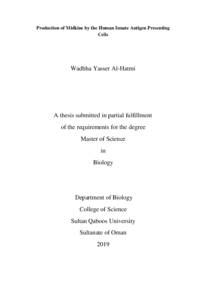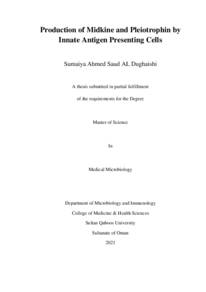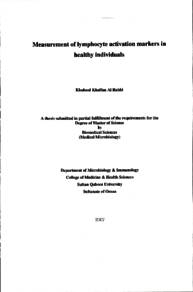وثيقة
Production of midkine by the human innate antigen presenting cells.
الناشر
Sultan Qaboos University.
ميلادي
2019
اللغة
الأنجليزية
الملخص الإنجليزي
Background: Midkine (MK) is a heparin-binding growth factor, with a low molecular
weight of 13 kDa. MK promotes reproduction, development, repair, survival, migration
and other activities of target cells. MK expression by innate the human immune system
antigen presenting cells, was suggested by a previous research work conducted in the
Department of Microbiology and Immunology, College of Medicine and Health
Sciences, Sultan Qaboos University (SQU).
Aim: This study aims to investigate the production of MK by the antigen presenting
cells (APCs) of the human innate immune system.
Methods: Monocytes, macrophages, monocyte-derived dendritic cells (MDDCs),
myeloid dendritic cells and plasmacytoid dendritic cells (pDCs) were obtained from
peripheral blood mononuclear cells (PBMCs) of healthy individuals (n=3 for each) and
then stimulated with Lipopolysaccharides (LPS), poly I:C, resiquimod, ODN and a
combination of all ligands to assess the synergistic effect of different Toll Like
Receptors (TLRs) in inducing MK production.
Results: MK expression was detected at the mRNA level in all the investigated APCs,
and at the protein level in monocytes, macrophages, MDDCs and pDCs only. No
synergistic effects were observed for the production of MK upon stimulation with the
different TLRs.
Conclusion: MK is expressed by some innate APCs upon triggering through TLRs that
use MyD88 and TRIF for their signaling. The expression of MK by these APCs
suggests a role for MK in the regulation of the immune system and in cell proliferation
and survival
المجموعة
URL المصدر
قالب العنصر
الرسائل والأطروحات الجامعية




